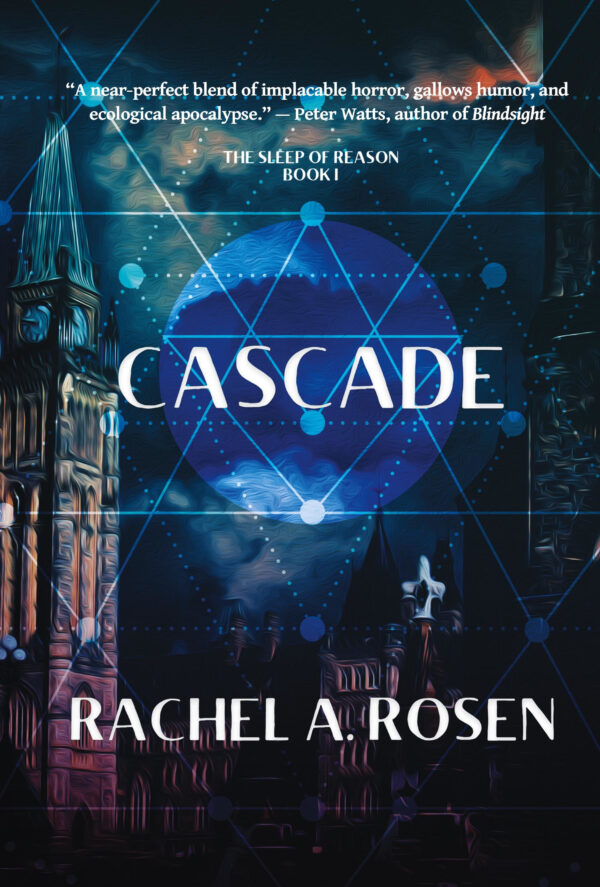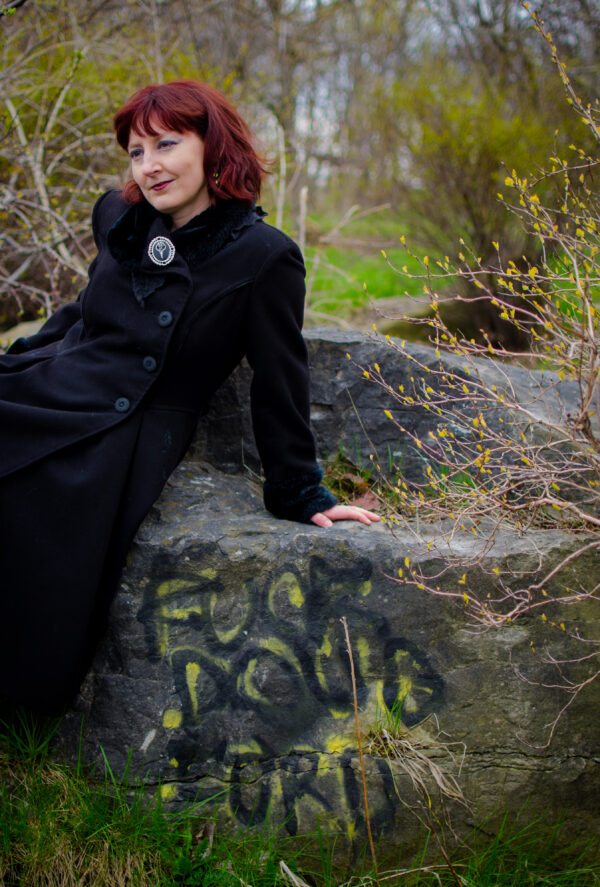
Welcome to my weekly Author Spotlight. I’ve asked a bunch of my author friends to answer a set of interview questions, and to share their latest work.
Today: RACHEL A. ROSEN lives and makes trouble in Tkaronto (Toronto) in the country currently known as Canada. A genre strumpet with an outlook darker than VantaBlack, she straddles urban fantasy, cosmic horror, dystopian futures, and eco-fiction. Her stone-cold bummer of a first novel, Cascade (The Sleep of Reason Book 1), was published by The BumblePuppy Press in 2022, and with Zilla Novikov, she’s the co-author of The Sad Bastard Cookbook: Food You Can Make So You Don’t Die. When she’s not hammering out the next book in the Sleep of Reason series, you can find her either under one of several cats, designing book covers, or indoctrinating the youth in hopes of getting them to come to class every now and again.
Thanks so much, Rachel, for joining me!
J. Scott Coatsworth: How would you describe your writing style/genre?
Rachel A. Rosen: I’m a shameless genre strumpet. The first book I published, Cascade, is a mashup of cosmic horror and eco-political-thriller; the second, The Sad Bastard Cookbook, is exactly what it says on the tin, and my latest two stories are science fiction about union organizing and fantasy about the publishing industry. I’m less interested in genre than in theme—I write about people struggling to survive in and make sense of the world in late-stage capitalism. The other commonality is pitch-black humour, but I’m not sure if I get to call myself a comedy writer if I’m the only person who thinks I’m funny.
JSC: Are you a full-time or part-time writer? How does that affect your writing?
RAR: I have a regular job as a high school teacher and a freelance job as a graphic designer, which is fortunate given how little money there is in writing books. I co-wrote a whole book about how much I love instant ramen but it doesn’t mean that I want to eat it every day. Accordingly, it takes me a good long time to produce anything, but everything I do produce is a passion project. Writing feels transgressive, like stealing out at midnight to battle villains before returning to put my glasses back on and downing a pot of coffee at my day job.
JSC: If you had a grant to write any book you wanted as a freebie without worrying about sales, what kind of story would you like to tell?
RAR: I actually have a plan for that! It’s an historical novel about a real-life pre-Soviet Russian anarchist detective living in exile in Paris in the early 1900s. I’ve had this project on the backburner for awhile, and I’m fascinated by the character and the milieu. But it’s something that I shelved because of the daunting amount of research I’d need to get the setting right versus the number of people who would be interested in reading a book about this. A grant would solve that problem, so if any wealthy benefactors with an interest in early 20th century revolutionary history want to fund me, I’m here.
JSC: What were your goals and intentions in Cascade, and how well do you feel you achieved them?
RAR: I began writing Cascade in a fugue state of despair—about the climate catastrophe, about the rise of fascism both in my country and worldwide, about the ability of the left to counterbalance those massive forces and to build a future that is humane and not a burning dystopian hellscape. The question arises: Is this a winnable fight by any meaningful metric? Andreas Malm has a brilliant passage in How To Blow Up a Pipeline where he speaks to the moral imperative of carrying on the struggle even in the knowledge that regardless of what you do, your choices are between “catastrophically worse” and “not quite as catastrophically worse.” While that book came out after I’d written Cascade, I think I captured a lot of the way many of us feel when negotiating the compromises and complicity of living in times of existential horror and tumult.
JSC: Who did your cover, and what was the design process like?
RAR: Since my freelance job is as a book cover designer, I thought—perhaps foolishly—that I had better do it myself. But it was one of the harder jobs I’ve done. When I’m reading the manuscript of a client, I’m often inspired to choose a particular scene or stylistic approach for their cover. But as an author, I tend to think that every scene is important. I came up with multiple variations before hitting on something that the publisher and I agreed worked for the book.
Just as we were about to reveal it, I found an edition of China Miéville’s complete works. The designer had gone with a really cool concept, which, by coincidence, was very similar to my really cool concept. I tried some variations on the design in hopes of being different enough. Ultimately, I ended up landing on a completely different design for the paperback.
The final version captures the premise well—it’s a novel about magic that takes place in stodgy Ottawa—though I still wonder how another designer might have interpreted it.
JSC: What character gave you fits and fought against you? Did that character cause trouble because you weren’t listening and missed something important about them?
RAR: That would be Blythe Augustine, the environmental scientist in Cascade. Without giving too many spoilers, she’s still causing trouble in the second book. She initially had a single function in the story, which was to explain the scientific basis for the magical catastrophe that first changes the world and then threatens its destruction. She was never meant to be a POV character, and I had actually intended to kill her off fairly early on in the book, but after writing a few of her scenes, I realized that both she and her worldview had a much more interesting and important role to play. She’s a difficult character to write in that she’s depressed, emotionally reserved, and has extensive subject expertise in a field that, at the start of writing the book, I knew absolutely nothing about. I think it’s worth it—her chapters are among my very favourites—but it’s definitely been a struggle.
JSC: What pets are currently on your keyboard, and what are their names? Pictures?
RAR: I can never resist a question about my cats, especially since I dedicated the book to them. Cocoa, my older cat, has been my steadfast writing companion for the entire time I was working on Cascade. Specifically, she sits on my arms while I write, and is responsible for introducing some typing that would probably be better suited to high fantasy. Sabot, my younger one, is more of a floor cat, but she has a meow that sounds like she’s possessed by the cursed soul of a Victorian orphan, which adds a certain Gothic ambiance.
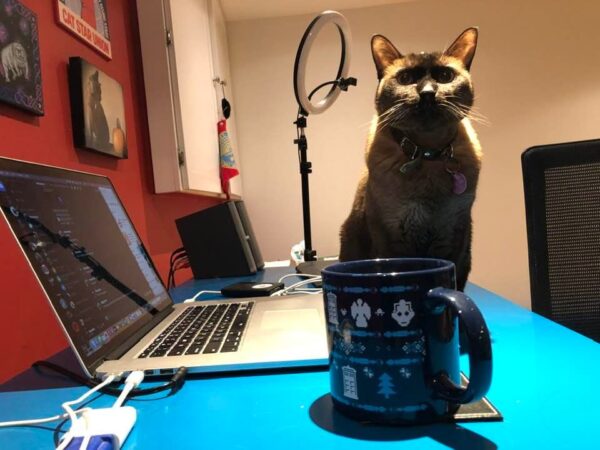
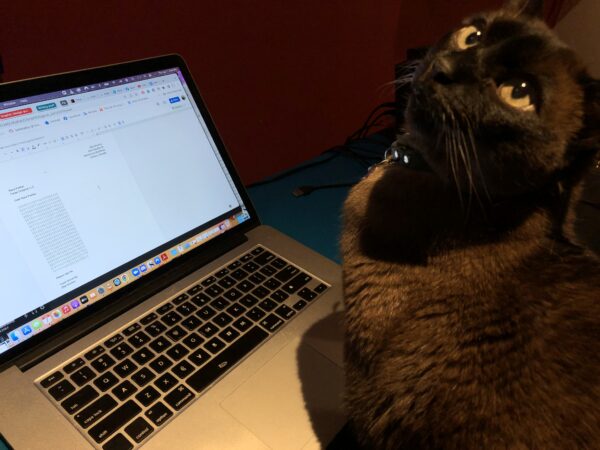
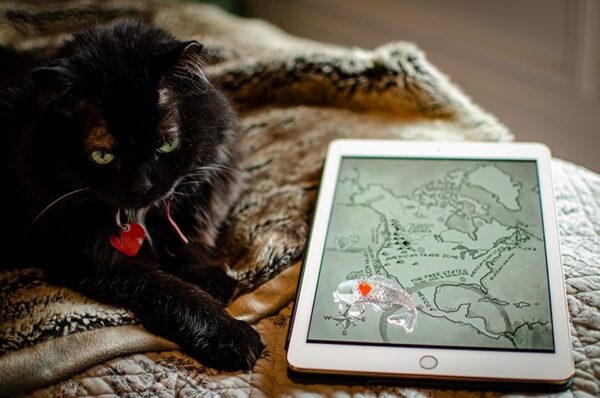
JSC: What qualities do you and your characters share? How much are you like them, or how different are they from you?
RAR: All of my characters came from my brain, so we share at least some commonalities. Of the main characters, each one specifically represents a problematic or negative quality or coping mechanism that I struggle with: anger, depression, compartmentalization, and insecurity. (I leave it to the alert reader to determine who is who.) And of course they also share some of my more positive qualities and interests, be it a history in activism or a nerdy special interest. I may vehemently disagree with Tobias’ political stances, but I share his appreciation for old cameras and opera. I’m not interested in writing characters that are self-inserts or mouthpieces for my ideas, so with everyone, I consciously give them traits that distinguish them from me. Even if it means that they’re fairly consistently wrong about everything.
JSC: What fantasy realm would you choose to live in and why?
RAR: There is only one answer to this question for me, and that’s Iain M. Banks’ Culture. But Rachel! That’s science fiction, not fantasy. I posit that no one in the Culture would ever make that kind of distinction, which is one of the many reasons why the Culture is great.
With a lot of the speculative fiction universes out there, it might be fun to read about the heroes’ adventures, but would you actually want to live in Middle Earth or Canes Venatici I as a regular civilian? You’d die of tetanus or run out of limbs pretty quickly. Even the heroes aren’t having the best time. Whereas Banks gives us a post-scarcity universe that is wonderful for nearly everyone—it’s diverse, it’s caring, and it’s always a party, at least until you encounter an Out Of Context Problem.
JSC: What are you working on now, and what’s coming out next? Tell us about it!
RAR: My big project is Blight, which is the sequel to Cascade and the middle book in the Sleep of Reason trilogy. It’s more survival focused and picks up three years after the end of the first book, and finds the characters navigating a radically altered environmental and political landscape. It’s also gayer. I always have a few projects on the go at a time. I’ve been toying with some short fiction set in the Sleep of Reason universe, as well as a YA murder mystery about a changeling. My latest short story, “Unsolicited,” which is about a literary agency in Hell, might even be out by the time this interview is published!
And now for Rachel’s newest book: Cascade:
In the wake of a worsening climate crisis, magic runs rampant and demons roam across the Canadian prairies. A long-dead god stirs in the Pacific Ocean, while the wilderness is choked by invasive, screaming grass.
The Cascade has shattered political stability, leaving a scandal-plagued government clinging to power in Ottawa. As catastrophe looms ahead, a precognitive rainman, Ian Mallory, stands between run-of-the-mill corruption and a nightmarish, dystopian future. It is up to a diverse and unlikely band of activists, scientists, journalists, and one underpaid, emoji-spell wielding intern to save their beleaguered country from its own worst impulses.
Publisher | Amazon
Universal Buy Link
Excerpt
As the door shut behind him, Sujay sighed ever so slightly. Oh, Jonah had time to think, right before the glamour dropped, she’s an illusionist.
At first he thought it was his own eyes failing before the rest of him started aging, the colour draining from his vision. But the office—the obligatory flag and formal photo of the Prime Minister, the brass lamp on the desk, the neglected but nevertheless tenacious cactus—didn’t change, nor did the robin’s egg of Ian’s tie. It was just Ian himself, unglamoured, hair grey, irises grey, skin and lips, all that same dreary monochrome. If he could still smile, his gums would be grey.
“Fucking hell, Mallory,” Jonah said. “What the fuck did they do to you?”
“Whadda y’at?” Ian shook his hand, his grip as vigorous as ever, then collapsed back into his chair. Without the glamour and the veneer of colour, the lines in his face were more pronounced. Politics, as the good Doctor Hunter S. Thompson had put it, was a drug, and magic an even more potent one. It wasn’t exactly surprising that Ian had become a self-destructive speed freak in the five or so years since Jonah had seen him last. He looked like he hadn’t slept in centuries. A handshake was all Jonah would be allowed; anything more and Ian would no doubt crumble to ash.
“That,” Jonah gestured vaguely at the closed door, “is not an intern.”
“She’s my apprentice.” His accent was thicker when the door closed.
“Talented girl. Probably keeping the entire country from falling apart lest they behold the monster I’ve become. I got lucky when she turned up.”
“How much are you using your powers that you’ve gone all Fifty Shades of Grey?”
“Didn’t hire you to be my fuckin’ mother, Joe.” He rubbed at his eyes. Even the bloodshot was grey. How did that even work, scientifically speaking? “We’re talking Instapot levels of pressure. It’s the fucking Siege of Stalingrad up here. They’re out for blood this time.”
“Saw your interview.”
Ian slid a paper under the mess of folders; Jonah caught only the slightest glimpse. A Pattern, the continuation of the ward labyrinth on his shoulder, drawn over architectural plans. “Tan’s nothing. I liked the picture though—it’s on my fridge at home.”
“You’re losing it. Losing them. The people who voted Abel in.”
“The fuck I am.” Ian picked up a pen on his desk and twirled it. There was no natural light in the office, because of course there wasn’t, but the metal clip caught the lamp and scattered gold over the gleaming wood. There was a thousand times more colour in those few little bright sparks than anywhere on Ian. “No one wants to be governed by fucking wizards. No one even wants to worry that they might, in some remote, abstract, indirect way, be governed by fucking wizards. You’ll all happily surrender every bit of autonomy to data mining companies who use your private information to force you to buy shit you don’t need, but the thought of someone influencing your opinions through magic is a massive subversion of democracy?”
“Well…” Jonah started, then, “you’re preaching to the converted here.”
“They’re not wrong. It’s just too late. The genie’s out of the bottle, and if the other side doesn’t already have someone like me, you can bet it’s not for lack of trying. And when they do, they’ll use him the exact same way the Party uses me. They’re just not going to be all open about it like I am.”
“Yeah.” He studied the dips and speckles of light. Ian had freckles, he remembered, that first summer up at the reclamation camp. He could, he thought, drag Ian out of this drab little office, into the sunlight. They could get in the car, and drive, and drive, until they were out of the city, its fecal toxicity, drive until the colour returned to his face. They could, but Ian wouldn’t. “You’re just a regular open book, aren’t you?”
“The worst thing,” Ian said, “is that I’m the most honest fella in this massive shitehole of a city.”
“Now that is terrifying.”

